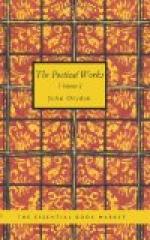IX.
Amidst that silent shower,
the royal mind
An easy passage found,
And left its sacred earth behind:
Nor murmuring groan express’d, nor
labouring sound,
Nor any least tumultuous breath;
Calm was his life, and quiet was his death.
Soft as those gentle whispers were,
In which the Almighty did appear;
By the still voice the prophet[93] knew
him there.
That peace which made thy prosperous reign
to shine,
That peace thou leavest to thy imperial
line,
That peace, oh, happy shade, be ever thine!
X.
For all those joys thy restoration
brought,
For all the miracles it wrought,
For all the healing balm thy mercy pour’d
Into the nation’s bleeding wound,
And care that after kept it sound,
For numerous blessings yearly shower’d,
And property with plenty crown’d;
For freedom, still maintain’d alive—
Freedom! which in no other land will thrive—
Freedom! an English subject’s sole
prerogative,
Without whose charms even peace would
be
But a dull, quiet slavery:
For these and more, accept our pious praise;
’Tis all the subsidy
The present age can raise,
The rest is charged on late posterity:
Posterity is charged the more,
Because the large abounding store
To them and to their heirs, is still entail’d
by thee.
Succession of a long descent
Which chastely in the channels ran,
And from our demi-gods began,
Equal almost to time in its extent,
Through hazards numberless and great,
Thou hast derived this mighty blessing
down,
And fix’d the fairest gem that decks
the imperial crown
Not faction, when it shook thy regal seat,
Not senates, insolently loud,
Those echoes of a thoughtless crowd,
Not foreign or domestic treachery,
Gould warp thy soul to their unjust decree.
So much thy foes thy manly mind mistook,
Who judged it by the mildness of thy look:
Like a well-temper’d sword it bent
at will;
But kept the native toughness of the steel.
XI.
Be true, O Clio, to
thy hero’s name!
But draw him strictly so,
That all who view the piece may know.
He needs no trappings of fictitious fame:
The load’s too weighty: thou
mayest choose
Some parts of praise, and some refuse:
Write, that his annals may be thought
more lavish than the Muse.
In scanty truth thou hast confined
The virtues of a royal mind,
Forgiving, bounteous, humble, just, and
kind:
His conversation, wit, and parts,
His knowledge in the noblest useful arts,
Were such, dead authors could not give;
But habitudes of those who live;
Who, lighting him, did greater lights
receive:
He drain’d from all, and all they
knew;
His apprehension quick, his judgment true:
That the most learn’d, with shame,
confess
His knowledge more, his reading only less.




